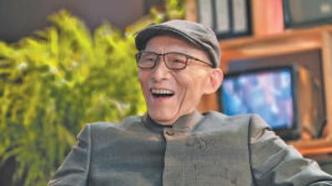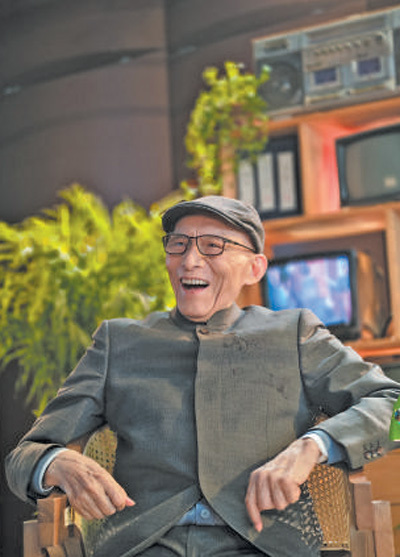

Recent photo of You Benchang. Photo provided by People's Daily Client
The role of "Uncle" in the hit TV series "Fang Hua" brought the 90-year-old You Benchang to the public again. There is a widely circulated shot: Uncle looked at A Bao in a suit and tie. In a few seconds, he was first stunned, then shocked, and finally relieved. One look "describes" the character of Uncle, and also outlines You Benchang's artistic career.
You Benchang, an actor from the China National Theatre, said: "The acting profession changed my destiny and the trajectory of my life." He is one of the first batch of young actors trained in New China. His pantomime skit "Shower" at the CCTV Spring Festival Gala in 1984 was impressive. In his 50s, the image of "Jigong" he created in the TV series "Jigong" has become a childhood memory for those born in the 80s and 90s. In his 70s, he sold his property to produce the drama "The Last Victory" and starred in it... At the age of 90, he is still thinking about acting.
Where does the charm and vitality of performance come from? How do actors maintain their original artistic aspirations and creative passion? With all these questions in mind, we went to You's home to interview him.
"Hard-core" actors can turn minor roles into classics
As we entered the living room, we stopped to look at a calligraphy work that read "Use literature and art to guide people's hearts". You Benchang regarded this sentence as his motto. He said that to educate people, actors should give their roles a kind of energy. This understanding was realized through his continuous learning and stage practice.
You Benchang was born in 1933. In 1952, he entered the acting department of the East China Branch of the Central Academy of Drama (now Shanghai Theatre Academy) and received training in the Stanislavsky acting system. In 1956, the newly established Central Experimental Theater recruited young actors. Because of his outstanding performance in the graduation drama "A Safe Journey", he was selected and became one of the first actors of the Central Experimental Theater.
Who doesn't want to play the leading role as an actor? But in Beijing, where there are so many talented people, You Benchang did not become a blockbuster, but learned the "first lesson" of a professional actor. Recalling the past, he sighed: "Self-knowledge is the basic quality of an actor."
You Benchang likes Peking Opera . In Peking Opera jargon, supporting roles are called "inside actors". Good supporting roles have their own artistic brilliance and are also given the nickname "hard inside" by the audience. You Benchang, who considers himself to be of average condition, has found his own artistic pursuit - to be a "hard inside" .
He was willing to work hard on character creation. In the drama "The Thunderstorm", You Benchang played an old serf who played a minor role. In order to play this character who had no lines, he read 19 books, learned about the old serf's dress, clothing and eating habits, and psychological logic, and determined how to play the role. On stage, he shed tears that fit the role and the plot. After the performance, an article commented: "This is a classic minor role!"
Playing the role of an uncle in his 80s, he stayed up late like a young man, memorizing lines in Shanghai dialect late at night, and prepared four or five plans for the director for each scene, rehearsing over and over again. His daughter You Sihan, who was accompanying him, was worried about this.
You Benchang told us a story. In 1987, during a performance in Singapore, he accidentally stepped on air and broke his foot, but he still insisted on going on stage the next day. He said that Gai Jiaotian broke his right leg while performing "Lion Tower". He endured the severe pain and stood on one leg until the curtain closed. "What I learned from Teacher Gai Jiaotian is the spirit of 'drama is more important than life'."
He cherishes the voice of criticism and is unforgettable to his collaborators who helped him find problems and improve his performance. "I have never played a leading role in a work directed by Sun Weishi, but she understood and supported my innovation, which laid the foundation for my performance," You Benchang said.
Recalling the rehearsal of the drama "A Servant of Two Masters", You Benchang said that his treatment of the servant role was different from that of the foreign actor who played the servant in the original work. "The 'servant' is a microcosm of the working people of that era. It is universal to be neither fat nor thin, tall nor short." In 1980, You Benchang won the first prize in the performance evaluation of the Central Direct Art Troupe for his role as a servant in the drama "A Servant of Two Masters".
"Young people ask me how to become a good actor. You have to be a good person first before you can become a good actor." You Benchang said slowly, "For a good person to become a good actor, there are still a series of professional problems that need to be solved. It is not that easy."
Cultural accumulation determines the depth of a character
In the opinion of Song Baozhen, director of the Chinese Academy of Arts' Drama Research Institute, the uncle portrayed by You Benchang has a kind of "scene" that reflects the drama actor's ability to grasp the role and the experience of "honing" a role on stage for a long time. Song Baozhen said: "The actor internalizes all kinds of understanding of the character into 'mental images' and manifests them as images." The texture of the character comes from this.
We asked Mr. You if he had any experience to base his role as Uncle on. He thought for a moment and said: "The role of Uncle is based on what I saw and heard in Shanghai after I was five or six years old. It runs through my life experience, learning and cultivation over more than 80 years, as well as my understanding of history."
The depth of a character comes from the actor's understanding of people, events, history and the times, and the actor's understanding is rooted in his own cultural accumulation and artistic attitude. Looking back at the series of characters created by You Benchang, this statement is indeed confirmed.
People often talk about how "Jigong" is You Benchang's 80th role after playing a series of minor roles. However, there are many "Jigong" in different art forms of the same era. Why is only "this one" lingering in the hearts of the audience?
You Benchang's creative method is to "retain the essence and remove the dross". In his opinion, the character of Jigong was created in feudal society and has the limitations of the times. "Only by dusting off some of the dust in the tradition and giving it the truth, goodness and beauty with modern consciousness can we achieve creative transformation and innovative development." In the novel, Jigong grabbed a steamed bun with his hands, and five black fingerprints appeared. The store owner thought it was dirty and quickly let Jigong take it away. "This is eating for free." You Benchang suggested that the director add a shot: Jigong finished eating the steamed bun and threw the copper coin over. The store owner said: "Oh, this monk..." This adaptation not only conforms to Jigong's character, but also reflects modern values, which is very sophisticated.
Audiences have complaints about some of the current routine performances. You Benchang believes that good actors "are not afraid of repetition and are always new in their performances." The method of "breaking the routine" comes from "having it in the heart." He talked about another "teacher" Mei Lanfang. "Peking opera art is one of the three major drama performance systems in the world. On the opera stage, a whip can bring about thousands of troops, and a table and two chairs can be changed endlessly. The aesthetics of Chinese opera is freehand and ethereal. It is a limited freedom and a regular freedom. Its charm needs to be understood. Our drama performances should also start from the heart." You Benchang said.
More than 10 years ago, You Benchang wrote on his Weibo account that he wanted to be an "old classmate who is active on stage and screen." Today, as a "post-90s", he is still learning and studying acting, "live, learn, and have fun until old age."
Why do people enjoy it so much and never get tired of it? You Benchang said: "A drop of water will never dry up if it merges into the sea."